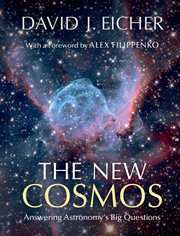Book contents
- Frontmatter
- Dedication
- Contents
- Foreword
- Preface
- Acknowledgments
- 1 The awakening of astronomy
- 2 How the Sun will die
- 3 The end of life on Earth
- 4 How the Moon formed
- 5 Where has all the water gone?
- 6 Why did Venus turn inside-out?
- 7 Is Pluto a planet?
- 8 Planets everywhere…
- 9 The Milky Way as barred spiral
- 10 Here comes Milkomeda
- 11 The Big Bang's cosmic echo
- 12 How large is the universe?
- 13 The mystery of dark matter
- 14 The bigger mystery of dark energy
- 15 Black holes are ubiquitous
- 16 What is the universe's fate?
- 17 The meaning of life in the universe
- Glossary
- Bibliography
- Index
15 - Black holes are ubiquitous
Published online by Cambridge University Press: 05 December 2015
- Frontmatter
- Dedication
- Contents
- Foreword
- Preface
- Acknowledgments
- 1 The awakening of astronomy
- 2 How the Sun will die
- 3 The end of life on Earth
- 4 How the Moon formed
- 5 Where has all the water gone?
- 6 Why did Venus turn inside-out?
- 7 Is Pluto a planet?
- 8 Planets everywhere…
- 9 The Milky Way as barred spiral
- 10 Here comes Milkomeda
- 11 The Big Bang's cosmic echo
- 12 How large is the universe?
- 13 The mystery of dark matter
- 14 The bigger mystery of dark energy
- 15 Black holes are ubiquitous
- 16 What is the universe's fate?
- 17 The meaning of life in the universe
- Glossary
- Bibliography
- Index
Summary
The best summary line about black holes I've ever heard came from the American theoretical physicist Kip S. Thorne (1940–), who described them during his talk at the first Starmus Festival in 2011: “The brightest objects in the universe – but no light!” That simple statement reveals much about the bizarre nature of black holes, objects of such intense gravity that nothing – not even light – can escape from them. Black holes are certainly among the favorite and most alluring objects in the universe for many astronomy enthusiasts, the subject of almost endless mystery and speculation. The reality of black holes is even stranger than the limited ideas many people have about them.
The knowledge base about black holes is of very recent vintage. When I joined the staff of Astronomy magazine in 1982, black holes were mostly a rumor. (The Milky Way black hole candidate Cygnus X-1 had been identified but not confirmed as a black hole; and astronomers believed quasars contained black holes, but had not yet confirmed that.) That was the case despite the fact that the conceptual ideas for these objects stretch back more than 230 years, to the English natural philosopher and clergyman John Michell (1724–1793). In a 1783 paper he wrote for the Philosophical Transactions of the Royal Society in London, Michell proposed the idea of “dark stars,” objects of such strong gravitational pull that nothing, including light, could escape them, and therefore the stars would be invisible.
In a visionary way, Michell even wrote that because such stars would be invisible, they would have to be detected from their effects on other objects around them, as with stars in a binary system in which one star had become “dark.” Several years after Michell's ideas were published, the great French mathematician and astronomer Pierre-Simon Laplace (1749–1827) also wrote about the same concepts in a book published in 1796.
Yet the evidence for black holes was extraordinarily slow in arriving. And the term black hole was not yet coined until relatively recent times.
- Type
- Chapter
- Information
- The New CosmosAnswering Astronomy's Big Questions, pp. 198 - 211Publisher: Cambridge University PressPrint publication year: 2015



